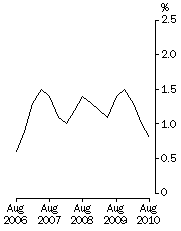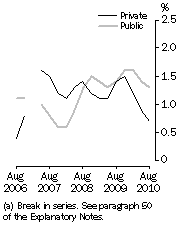AUGUST KEY FIGURES
 |  | Aug 2010 | May 2010 to Aug 2010 | Aug 2009 to Aug 2010 |
 |  | $ | % change | % change |
TREND ESTIMATES |
|
| Private & public sectors |  |  |  |
 | Full-time adult ordinary time earnings | 1 259.40 | 0.6 | 4.4 |
 | Full-time adult total earnings | 1 312.00 | 0.8 | 4.7 |
 | All employees total earnings | 982.90 | 0.6 | 4.7 |
| Private sector |  |  |  |
 | Full-time adult ordinary time earnings | 1 232.00 | 0.5 | 4.0 |
 | Full-time adult total earnings | 1 286.20 | 0.7 | 4.3 |
| Public sector |  |  |  |
 | Full-time adult ordinary time earnings | 1 359.00 | 1.2 | 5.9 |
 | Full-time adult total earnings | 1 404.10 | 1.3 | 6.0 |
SEASONALLY ADJUSTED ESTIMATES |
|
| Private & public sectors |  |  |  |
 | Full-time adult ordinary time earnings | 1 257.20 | 0.4 | 4.5 |
 | Full-time adult total earnings | 1 310.10 | 0.6 | 4.8 |
 | All employees total earnings | 977.40 | -0.5 | 4.1 |
| Private sector |  |  |  |
 | Full-time adult ordinary time earnings | 1 229.50 | 0.2 | 4.0 |
 | Full-time adult total earnings | 1 283.30 | 0.3 | 4.3 |
| Public sector |  |  |  |
 | Full-time adult ordinary time earnings | 1 359.60 | 1.5 | 6.3 |
 | Full-time adult total earnings | 1 404.30 | 1.4 | 6.3 |
|
Full-time adult total earnings, Quarterly % change in trend estimates - All Sectors

| Full-time adult total earnings, Quarterly % change in trend estimates - Private and Public (a)

|
AUGUST KEY POINTS
TREND ESTIMATES
- Full-time adult ordinary time earnings rose by 4.2% for males and 4.7% for females in the twelve months to August 2010.
- In the twelve months to August 2010, full-time adult total earnings rose by 4.5% for males and 4.8% for females.
NOTES
FORTHCOMING ISSUES
| ISSUE (QUARTER) | Release Date |
| November 2010 | 24 February 2011 |
| February 2011 | 19 May 2011 |
NOTES ON ESTIMATES
COMPOSITIONAL EFFECTS. Movements in average weekly earnings can be affected by both changes in the level of earnings per employee and changes in the composition of the labour force. For example, changes in the proportions of full-time, part-time, casual and junior employees and variations in the distribution of occupations can affect movements in earnings series. Refer to paragraphs 28 and 29 of the Explanatory Notes.
SAMPLING ERROR
For information on sampling error, see the Technical Note at the end of this publication. Standard errors for the original estimates contained in this publication are in tables 18 to 20.
INQUIRIES
For further information about these and related statistics, contact the National Information and Referral Service on 1300 135 070 or Evan Wallace on Perth (08) 9360 5304.
 Print Page
Print Page
 Print All
Print All